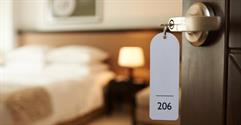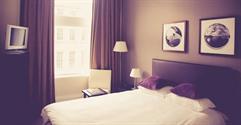In the early 90s most “young female students living in Blackpool worked in a hotel, guesthouse or B&B on the weekends and school holidays” and at the age of 13 Claire Smith did just that.
When Claire left
A family affair
The hospitality industry certainly runs in the family. Her husband’s parents and grandparents all owned guesthouses and hotels in Blackpool, so when her son reached school age the couple decided it was time for a career change.
“Back then there was no breakfast club or after-school club,” she recalls. “Our lives had to change to fit in school times and a 3.30pm end of school day, so buying our own hotel was the obvious choice.’”
Claire and her husband have now been running the Number One South Beach hotel and a B&B – Number One St Lukes – for 24 years. Now representing the fourth generation of hoteliers in the Smith family, Claire’s 27-year-old son Ben undertakes the online tasks his parents would rather avoid.
Claire strongly believes that hospitality is a greatly undervalued career choice for women with children. As a hotelier she enjoys a “fulfilling, demanding and successful career” with the added bonus of being a “stay-at-home mum”.
Business plan
As with any venture a business plan is a crucial starting point. But Claire is keen to point out that you should do it for yourselves and not just the bank.
“It really focuses you on your aims and ambitions, how you’re going to get there, the timescales and it gives you a real understanding of the financials involved. If you do a really good job of the business plan then, as the years
To raise finance for their first property the pair put together an information pack, something Claire strongly recommends. She suggests including things like:
• A background of yourself and why you think you’d be successful as a hotelier, alongside the financials, timescales etc
•Brochures from similar establishments so the assessor can build a mental picture
• An explanation of your vision – what will make you stand out from the crowd?
• Your marketing and branding ideas, with possible tariffs and on what basis you arrived at these prices
• Market research, including rates on offer from competitors, so the assessor appreciates that you’ve done your homework
Finance
When looking for financing, shop around and don’t assume your bank will be your best option, Claire advises.
There are plenty of funding options available to small business owners, she continues. Talk to the business arm of your local council, consult with your accountant, speak to the Federation of Small Businesses (FSB) and Chamber of Commerce.
The more evidence that you can provide to a prospective lender supporting your viability as a borrower, the stronger your case will be, says Claire. The Smiths also conducted a feasibility study and it was this that persuaded the banks to lend to them.
You must convince the lender that you know what you’re doing, that you can pay back what you borrow and that you’re a low risk. “Convincing the bank to lend you money is important,” says Claire, “but far more importantly, you need to convince yourselves that it’s financially viable and a worthy business proposition, because the only one going to lose any money usually is yourself – the others have ways and means of getting their money back.”
When asked about competing with large chains Claire says it’s vital that you go above and beyond in terms of customer service.
Personalise your service
It’s usually the small things that make the difference. One of Claire’s “tricks” is to find out a little about the guest before their stay – the reason for their stay and their interests – then emailing relevant links to events/shows/discount codes/vouchers/special offers etc.
Beware of lowering rates
It’s all too common for hoteliers to drop their rates in challenging times, only to drop standards too when margins become tight.
Claire’s husband has a saying: “If you don’t value your own product then nobody else will.” Add value, offer the chance to upgrade, perhaps offer lower rates for longer stays – but be wary of discounting, they both warn.
Adaptability
"You absolutely need to be a jack of all trades and master of them all, or at least when you're setting out."
In
Staffing issues only amplify the pressure. Someone “gets ill, has an accident, family crisis etc and you will be left, at least for a short while, up the creek.”
Accounting
Accounting is integral to the running of the business, says Claire, as you don’t want to be working or nothing or, even worse, at a loss.
She suggests employing an accountant to track income and control expenditure as well helping with VAT, workplaces pensions etc.
Website
A strong online presence is essential in the age of social media and customer reviews. Online bookings are particularly challenging.
Three-quarters of late bookings are now made via PCs, phones
Say a guest pays £100 for your room – deduct:
£20.00 20% VAT
£15.00 15% commission to
£ 5.00 credit/debit card charges
£40.00 total charges
So your £100 room is reduced to £60 before the guest even arrives, and on top of
It is therefore essential that your website has its own booking system. Describing the website as “a shop window” Claire says it must be visually strong, updated regularly and mobile-friendly.
Branding and hidden costs
A strong brand that is consistent across the business – from your website and stationery to indoor and outdoor signage – is particularly important in the hospitality industry.
Start-up costs or the costs of a post-acquisition refurbishment can be significant.
For cost-effective PR Claire suggests offering free stays for journalists or free meals for guests to generate interest.
Marketing can be unexpectedly expensive. “All these ‘random’ extras add up and have to be considered,” she warns. “You don’t want to get the business all set up,
“There’s no use having a newly opened beautiful hotel if nobody knows you’re there!”
Claire suggests including a 10% contingency in your spending projections as “there are always hidden extras,
Advice for aspiring hotel owners
First and foremost, ask yourself if you “are you the right person for the job.”
Do your research – investigate every aspect of the business, the local area and the demographic profile of visiting tourists or business
Listen to others but don’t take it as gospel – Heed all advice, but do what you think is right, be confident in your decisions and do it your way. Don’t let others steer you away from your vision.
Remember, it’s going to be extremely hard work – It’s a lifestyle business where you’ll be on call 24-7.
Finally, there are some major advantages to the hotelier lifestyle to go with the drawbacks. While you may not draw a great salary in the first few years, your living costs can be negligible.
“Any business pays its own running costs and in the case of a guesthouse or hotel where you live on the premises, running costs are also your living costs, so any salary taken is pretty much disposable income,” says Claire.
“The business should pay for the gas, electricity, rates, water
“You literally live for free. Add it all up and it comes to a substantial saving.”
If you enjoyed this article, sign up for a free BusinessesForSale.com account to receive the latest small business advice, features, videos


